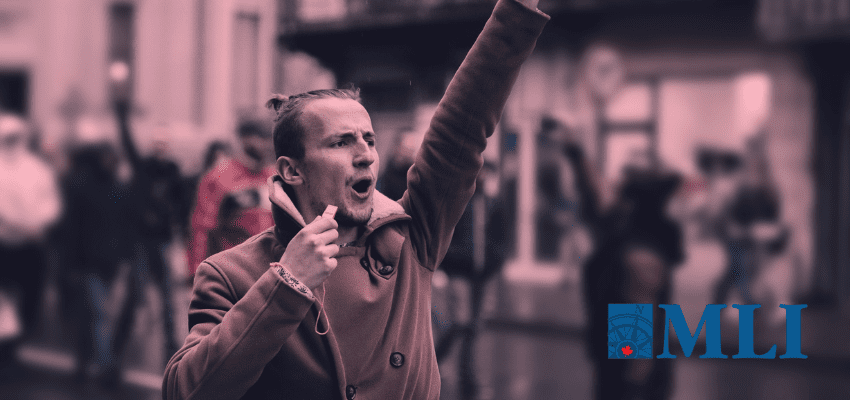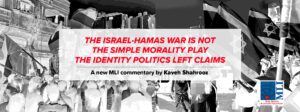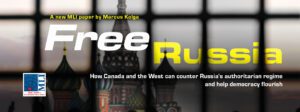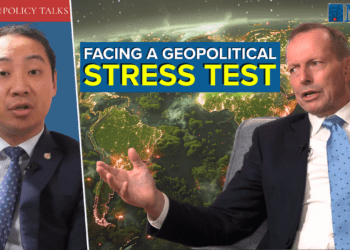By Marcus Kolga, December 19, 2024
The violent anti-NATO and anti-Israeli protests in Montreal last month exposed the threat that the toxic intersection of far-left extremism and foreign influence operations pose to the foundations of Canada’s democracy.
Outside a meeting of NATO parliamentary delegates on November 22, a mob vandalized property, shut down streets, and echoed slogans that, disturbingly, align with the geopolitical objectives of both Vladimir Putin’s Russia and Iran. This convergence is not new, but its visibility and aggressive nature was alarming.
For years, much of the focus on Russian influence operations in Canada has been on the far-right. This is understandable. In cases such as the Tenet Media scandal, where two Canadian far-right influencers allegedly collaborated with Russian agents, the Kremlin’s playbook was explicit.
But here’s the critical point: it’s not just the far-right that has, knowingly or unwittingly, collaborated with Russian state entities. The far-left has long been fertile ground for Kremlin influence.
Historically, this relationship goes back to the Stalinist era, when the 1945 defection of Soviet cipher clerk Igor Gouzenko in Ottawa revealed nearly two dozen Canadians recruited to serve Soviet interests – including members of the Canadian Communist Party. This tradition of influence has evolved, with Putin now committing billions to these operations (as evidenced by a recently unsealed FBI affidavit).
Regime controlled Potemkin-village think tanks and institutions like Vladimir Putin’s Valdai Club and the Russian International Affairs Council have been established to identify, connect, and exploit academics, activists, and journalists in Canada and other western democracies.
These individuals are often used to launder Kremlin propaganda, presenting it as credible and independent analysis. This “detergent” effect has allowed the Kremlin to launder regime narratives, enabling them to seep into mainstream discourse, eroding trust in democratic institutions and alliances like NATO.
In the months following the brutal Hamas terror attack on October 7, 2023, we have seen further evidence of Russian and Iranian cooperation and alignment on disinformation narratives. Reports indicate that both Iran and Russia have actively promoted anti-Israel narratives globally and even within Canada.
In Montreal, this alignment was on full display, in a protest organized by Divest for Palestine and Convergence of Anti-Capitalist Struggles. Among the mob vandalizing streets were Russian, Palestinian and Communist Party of Canada flags and even the banner of the Russian-occupied Donetsk region in Ukraine.
How a symbol of Russian occupation and colonization made its way into a Canadian protest is a question that demands investigation. It is no stretch to suspect the involvement of the Russian consulate in Montreal, known as a hub for Russian intelligence activity.
Adding to the intrigue, video evidence captured masked vandals using Russian phrases – hardly a coincidence in a protest supposedly centered on NATO and Israel.
This is not the first time far-left Canadian activists have parroted Russian narratives. Some have, over the past three years of Russia’s invasion of Ukraine, travelled to Russia for conferences, meeting high-ranking Kremlin officials. Their messaging – anti-NATO, anti-Israel, anti-Ukrainian – is tailor-made to support the Kremlin’s objectives of destabilizing western democracies and sowing division within them.
Ignoring and dismissing these connections risks further enabling Russian government efforts to interfere and manipulate the sovereignty of our information environment. The Kremlin’s strategies are multi-pronged: they fund media operations, exploit ideological extremes on both ends of the spectrum, and leverage social movements to advance their goals. The aim is clear: weaken Canada’s democratic institutions, divide its society, and erode its alliances.
Despite these clear warning signs, the Canadian government, intelligence, and media have largely ignored the threat. Complacency is dangerous. We have finally mustered the courage to confront Chinese influence operations in Canada; now, we must extend the same vigilance to Russia and Iran.
Our law enforcement and intelligence agencies need to investigate incidents like those in Montreal, as well as the individuals and organizations collaborating with organizations like RT and Valdai Club, which are controlled by our foreign authoritarian adversaries. The presence of Russian flags at a violent protest is not merely symbolic; it is a signal of deeper, organized efforts to undermine our democracy.
Far-left extremism, like its far-right counterpart, is a vulnerability that authoritarian regimes exploit and weaponize against us. Both movements share a deep disdain for the democratic foundations that underpin our society. Defending our democracy against these dark forces requires a non-partisan, whole-of-society approach and an end to the naivety that leaves us perilously exposed to them.
Marcus Kolga is a senior fellow at the Macdonald-Laurier Institute specializing in Russian foreign policy and disinformation/propaganda.








